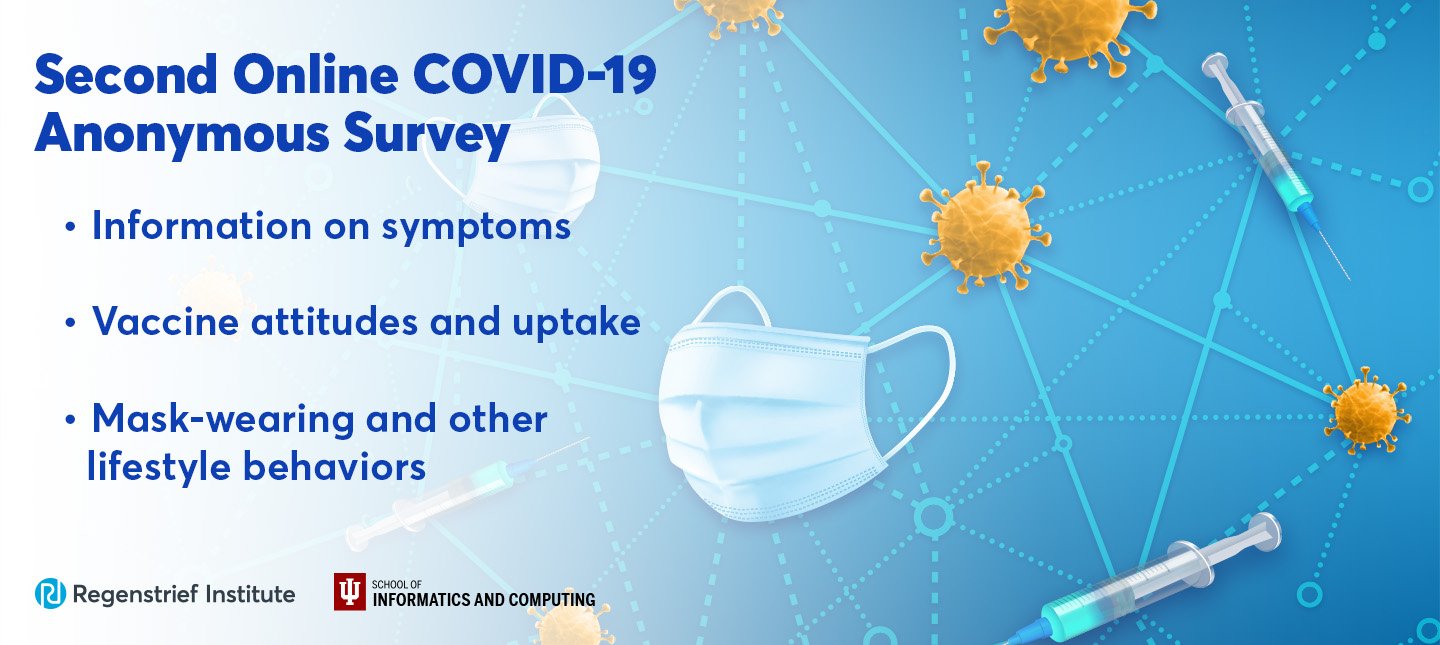Data shows willingness to get vaccine, reaches at-risk population
Regenstrief Institute and Indiana University launched a second online survey to gather data about COVID-19 symptoms, behaviors, and vaccine attitudes following the success of a pilot project. The questionnaire allows researchers to gather large quantities of data from across the U.S. quickly.
The pilot survey went online in April 2020 with questions about individuals’ COVID-19 symptoms, general location and travel history. It was distributed via banner ads on Microsoft News (MSN) and was voluntary and anonymous. Researchers received more than 87,000 responses, providing crucial insight into the prevalence of COVID-19 symptoms and testing when testing was limited in most of the world.
The second survey was launched on MSN in mid-December 2020. In addition to questions about symptoms, the new survey also asks about attitudes toward vaccines as well as individual behaviors to prevent COVID-19, such as eating indoors and wearing a mask. The research team will continually update the survey and hopes to continue gathering responses through the spring.
“The pilot project indicates this is a viable method to gather crucial public health data,” said Shaun Grannis, M.D., M.S., a project leader. “In this second survey, we continue to receive a large number of responses providing insight into a population that we might not have access to otherwise.” Dr. Grannis is the Regenstrief vice president for data and analytics and a professor of family medicine at Indiana University School of Medicine.
“Many of the respondents are older than 50, a group at higher risk for more serious cases of COVID-19 and eligible for vaccination in many states,” said Brian Dixon, PhD, MPA, a project leader and the director of public health informatics at Regenstrief Institute and Indiana University Richard M. Fairbanks School of Public Health at IUPUI. “The data so far indicate that more than half of individuals would take a vaccine today if it were offered to them, information that is reassuring to public health experts, especially considering the respondents’ age.”
Another question in the survey is, “Do you know anyone who has been affected by COVID-19?” About two-thirds of respondents said yes, an indication of just how prevalent the disease is.
The survey is also measuring vaccine uptake as well as mask-wearing behavior, employment and other factors.
Information from the survey will be analyzed and published to inform public health leaders.
About Regenstrief Institute
Founded in 1969 in Indianapolis, the Regenstrief Institute is a local, national and global leader dedicated to a world where better information empowers people to end disease and realize true health. A key research partner to Indiana University, Regenstrief and its research scientists are responsible for a growing number of major healthcare innovations and studies. Examples range from the development of global health information technology standards that enable the use and interoperability of electronic health records to improving patient-physician communications, to creating models of care that inform practice and improve the lives of patients around the globe.
Sam Regenstrief, a nationally successful entrepreneur from Connersville, Indiana, founded the institute with the goal of making healthcare more efficient and accessible for everyone. His vision continues to guide the institute’s research mission.
About the Richard M. Fairbanks School of Public Health at IUPUI
Located on Indiana’s premier research and health sciences campus, the Richard M. Fairbanks School of Public Health at IUPUI is committed to advancing the public’s health and well-being through education, innovation and leadership. The Fairbanks School of Public Health is known for its expertise in biostatistics, epidemiology, cancer research, community health, environmental public health, global health, health policy and health services administration.
About IU School of Medicine
IU School of Medicine is the largest medical school in the U.S. and is annually ranked among the top medical schools in the nation by U.S. News & World Report. The school offers high-quality medical education, access to leading medical research and rich campus life in nine Indiana cities, including rural and urban locations consistently recognized for livability.
About Shaun Grannis, M.D., M.S.
In addition to his role as the vice president of data and analytics at Regenstrief Institute, Shaun Grannis, M.D., M.S., is the Regenstrief Chair in Medical Informatics and a professor of family medicine at Indiana University School of Medicine.
About Brian E. Dixon, PhD, MPA
In addition to his role as Regenstrief Institute and Indiana University Richard M. Fairbanks School of Public Health at IUPUI director of public health informatics, Brian E. Dixon, MPA, PhD, is a research scientist at Regenstrief and an associate professor of epidemiology at the Fairbanks School of Public Health. He is also an affiliate scientist at the U.S. Department of Veterans Affairs Health Services Research and Development Center for Health Information and Communication, Richard L. Roudebush VA Medical Center.










